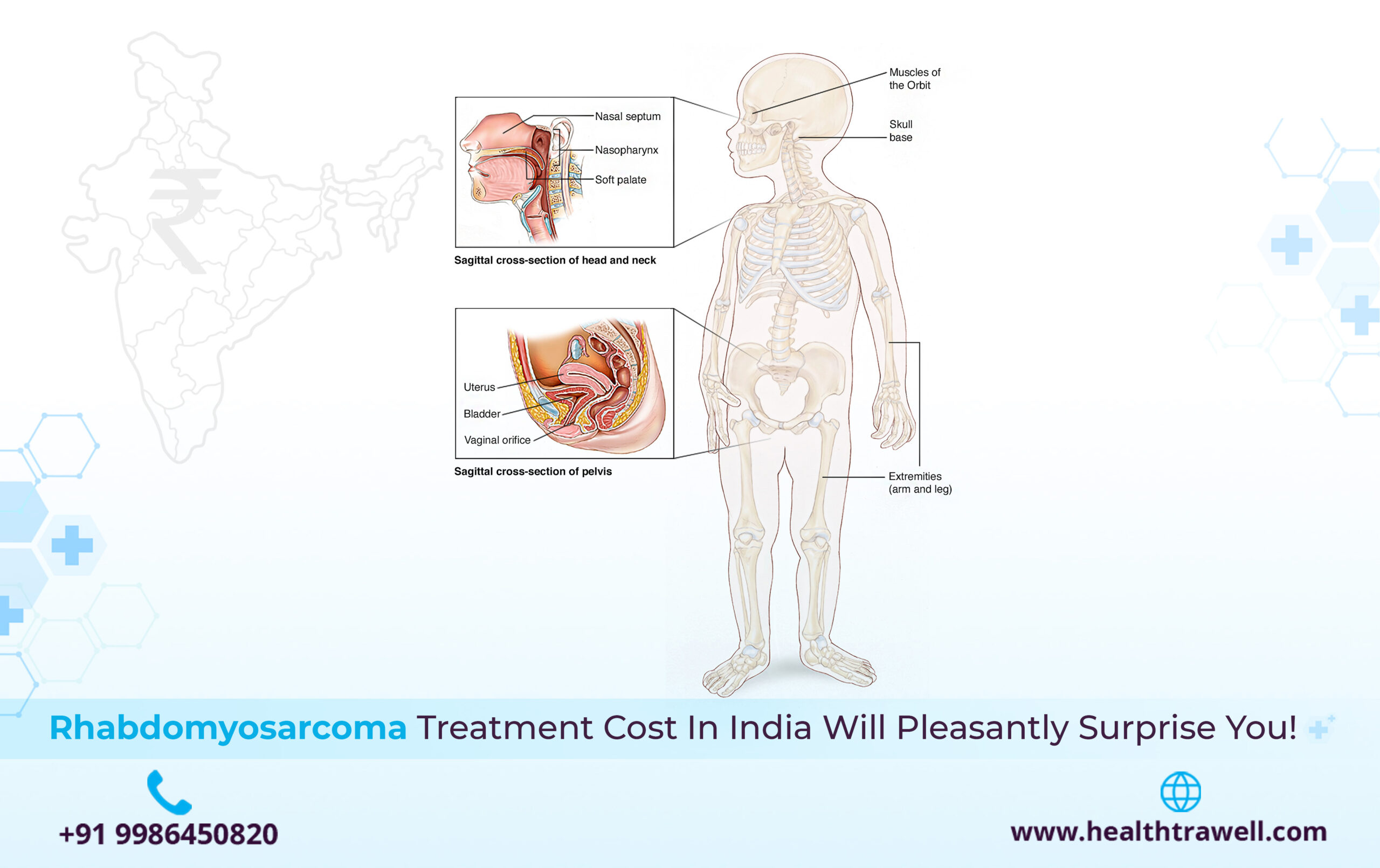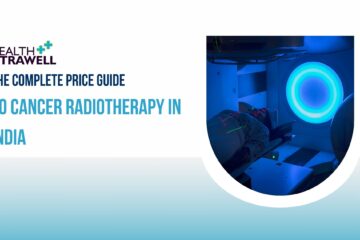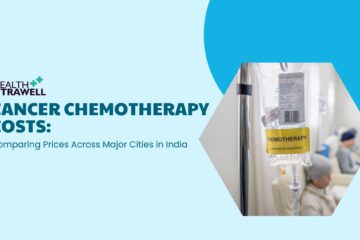Rhabdomyosarcoma Treatment Cost in India Will Pleasantly Surprise You!

Whichever place you travel somehow becomes a part of you! – from the words of Anita Desai
Get Rhabdomyosarcoma Treatment in India with Health Trawell as Your Escort Here!
Risk Factors of Rhabdomyosarcoma
Complications of Rhabdomyosarcoma
Rhabdomyosarcoma Treatment Cost in India as Compared to Other Countries
Rhabdomyosarcoma: Understanding a Rare Cancer
Rhabdomyosarcoma (RMS) is a rare type of cancer that arises in the soft tissues, specifically in the cells that normally develop into skeletal muscles. It most commonly affects children and adolescents, but it can occur in people of any age. Let’s touch upon the Rhabdomyosarcoma treatment cost in India compared to other countries.
Overview of Rhabdomyosarcoma
Rhabdomyosarcoma originates from the embryonic cells that develop into muscles. It can occur in various locations within the body, such as the head, neck, bladder, vagina, and limbs. There are several subtypes of rhabdomyosarcoma, including embryonal, alveolar, pleomorphic, and anaplastic.
Symptoms of Rhabdomyosarcoma
The symptoms of rhabdomyosarcoma depend on the tumour’s location. Common signs & symptoms may include the ones discussed underneath:
- A mass/swelling that could be felt/seen.
- Pain/tenderness at the tumour site.
- Unexplained weight loss.
- Fatigue & general weakness.
- Headaches or visual changes if the tumour affects the head or neck region.
- Difficulty breathing or swallowing if the tumour affects the chest or throat.
Causes of Rhabdomyosarcoma
The exact cause of rhabdomyosarcoma is unknown. However, certain genetic mutations and alterations have been associated with the development of this cancer. These mutations can disrupt normal cell growth and lead to uncontrolled proliferation of immature muscle cells.
Risk Factors of Rhabdomyosarcoma
While the exact cause of rhabdomyosarcoma remains unclear, several risk factors have been identified, including the ones discussed below:
- Age: Children & adolescents are at higher risk, with most cases diagnosed before the age of 10.
- Genetic disorders: Certain genetic conditions, such as Li-Fraumeni syndrome and neurofibromatosis type 1, increase the risk of developing rhabdomyosarcoma.
- Family history: Having a family history of rhabdomyosarcoma or other cancers may slightly increase the risk.
- Environmental factors: Exposure to radiation or certain chemicals during pregnancy or early childhood may be linked to an increased risk of developing rhabdomyosarcoma.
Complications of Rhabdomyosarcoma
Rhabdomyosarcoma can lead to various complications, depending on its location and stage. Complications may include the ones we are discussing below:
- Metastasis: The cancer cells can spread to other parts of the body, such as the lungs, bones, or lymph nodes.
- Tumour compression: Depending on the tumour’s location, it may compress nearby structures, leading to complications like difficulty breathing, swallowing, or impaired organ function.
- Treatment side effects: The treatments for rhabdomyosarcoma, such as chemotherapy and radiation therapy, can cause short-term and long-term side effects, including fatigue, nausea, hair loss, and increased susceptibility to infections.
Diagnosis of Rhabdomyosarcoma
To diagnose rhabdomyosarcoma, a healthcare professional will perform a battery of tests & investigative procedures, as discussed below:
- Medical history and physical examination: The doctor will inquire about symptoms and perform a thorough examination to identify any abnormal masses or swelling.
- Imaging tests: X-rays, ultrasounds, CT scans, PET, & MRIs may be used to visualize the tumour and determine its size and location.
- Biopsy: A small sample of the tumour is surgically removed and examined under a microscope to confirm the diagnosis and determine the specific subtype of rhabdomyosarcoma.
- Additional tests: Additional tests, such as blood tests, bone scans, or lumbar punctures, may be performed to assess the extent of the disease and check for metastasis.
Treatment of Rhabdomyosarcoma
The treatment of rhabdomyosarcoma typically involves a multidisciplinary approach, combining surgery, chemotherapy, and radiation therapy. The specific treatment plan depends on factors such as the tumour’s location, stage, and subtype, as well as the patient’s age and overall health. Surgery aims to remove the tumour whenever feasible, while chemotherapy and radiation therapy are used to target any remaining cancer cells. In some cases, targeted therapies and immunotherapy may be employed to enhance the treatment’s effectiveness. Supportive care, including pain management and psychosocial support, is an essential component of the overall treatment plan.
Rhabdomyosarcoma Treatment Cost in India as Compared to Other Countries
Rhabdomyosarcoma treatment cost can vary significantly depending on the country, healthcare system, treatment facility, and individual patient factors. India is known for providing high-quality medical care at a lower cost compared to many other countries. Rhabdomyosarcoma treatment cost in India can be considerably less expensive than in countries like the United States or Europe, making it an attractive option for patients seeking affordable treatment without compromising on quality.
Get Rhabdomyosarcoma Treatment in India with Health Trawell as Your Escort Here!
If you or your loved one experiences any concerning symptoms of rhabdomyosarcoma, accurate diagnosis and appropriate treatment becomes essential. Always remember to discuss the Rhabdomyosarcoma treatment cost in India and potential options here with the Health Trawell’s team to make informed decisions regarding the best care.



